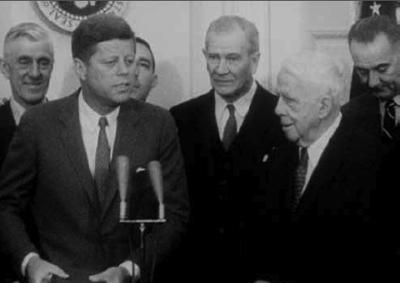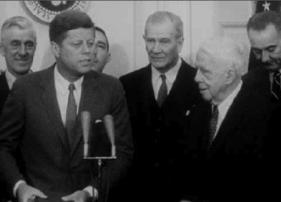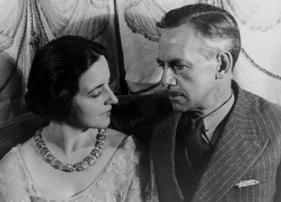Read UCLA Today's article on director Shirley Clarke -- "Archive Rekindles Interest in Once-Marginalized Filmmaker"
"An effective, moving document of a man in the last few months of his life, a man who appeared much in public (as the semi-official poet laureate of the Kennedy Administration) but whose private side was not well known.” -- Film Quarterly
Directed by Shirley Clarke, Robert Hughes
“The artist, however, faithful to his personal vision of reality, becomes the lost champion of the individual mind and sensibility, against an intrusive society and officious state.”—John F. Kennedy
The opening remarks of President John F. Kennedy’s speech on the occasion of Robert Frost receiving the Congressional Gold Medal in March of 1962, also forms the epigraph for director Shirley Clarke’s powerfully human portrait of Frost, shot just months before the iconic poet’s death in 1963. Clarke follows through on Kennedy’s theme by intercutting footage of Frost out in the world—speaking to students, touring a naval vessel, delivering a talk at Sarah Lawrence College—and scenes of his purposeful, solitary puttering around the house and grounds of his rural home in Ripton, Vermont. Clarke captures the rhythmic flow of the poet’s life, from gathering up calm to vibrant engagement. Ever one to challenge convention, Clarke allows her subject to comment on her approach. Speaking to his audience at Sarah Lawrence, Frost indicates to the cameras on stage with him: “What you’re seeing here, this sideshow, this is a documentary film going on…but it is a false picture that presents me as always digging potatoes or saying my own poems.” The audience bursts out laughing, caught up in the whimsical spell that the 88-year-old literary giant casts on everyone he encounters, including Clarke.
Though born and raised in San Francisco, Frost came to prominence in the first half of the 20th century as a poet of rural New England where he made his home. In poems such as “The Road Less Traveled,” “Mending Wall,” “Birches” and “Stopping by Woods on a Snowy Evening,” Frost deployed everyday language—what he called "the sound of sense”—to describe encounters with the natural world and scenes of farming life that resonate with a distinctly American melancholy and joy. As poet and critic Randall Jarrell wrote of Frost, “No other living poet has written so well about the actions of ordinary men.” Clarke’s visual style rises to meet the colloquial power of Frost’s work with handheld intimacy and grace. Originally produced for WGBH, Robert Frost: A Lover’s Quarrel with the World won the Academy Award for best Feature Documentary.
Paul Malcolm
WGBH-TV. Producer: Robert Hughes. Written by: Robert Hughes. Cinematographer: Terence McCartney Filgate. Editor: Charlotte Zwerin. With: Robert Frost, John F. Kennedy, Randall Jarrell, G. Armour Craig, Louis Untermeyer.
35mm, b/w, 51 min.
Preserved by the Academy Film Archive and UCLA Film & Television Archive from two 35mm acetate prints. Laboratory services by The Stanford Theatre Film Laboratory, Audio Mechanics, and NT Picture and Sound. Special thanks to Joe Lindner, Robert Gitt.






 Mobile Navigation
Mobile Navigation



